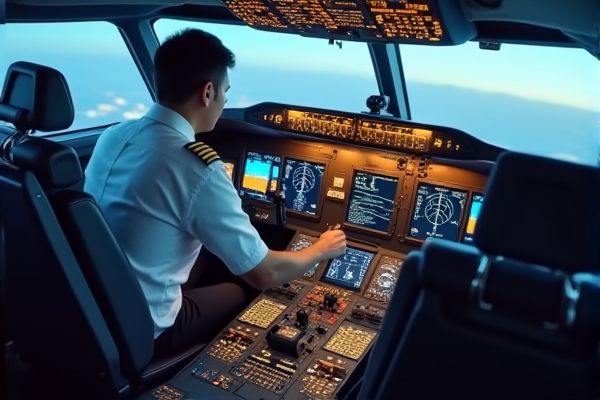
The aviation industry in the Philippines offers a variety of pilot job opportunities across commercial airlines, charter services, and cargo transport. Airlines such as Philippine Airlines, Cebu Pacific, and AirAsia frequently seek qualified pilots to join their expanding fleets, especially as travel demand increases. Flight training schools and private operators also provide opportunities for newly licensed pilots to gain experience and build hours necessary for advancement. Engaging with aviation job portals and networking within pilot communities can greatly enhance your prospects in securing a position that aligns with your career goals.
Job Description
Pilot jobs in the Philippines require a comprehensive understanding of aviation regulations and safety protocols specific to the country. Candidates typically need to hold a valid Commercial Pilot License (CPL) with an instrument rating, along with substantial flight hours to qualify for various positions. Airlines and charter companies in the Philippines often seek pilots with strong communication skills to effectively collaborate with ground crews and air traffic control. Competitive salary packages and opportunities for career advancement make these pilot positions appealing to aviation professionals in the region.
Requirement
Pilot jobs in the Philippines require candidates to hold a valid commercial pilot's license issued by the Civil Aviation Authority of the Philippines (CAAP). Applicants must complete a specified number of flying hours, typically a minimum of 150 hours for commercial pilots and around 1,500 hours for airline transport pilots. Proficiency in English is essential, as it is the international language of aviation, and candidates may be required to pass written and practical examinations to demonstrate their skills. Continuing education and regular medical examinations ensure that pilots maintain the qualifications necessary for safe flying and compliance with aviation regulations in the Philippines.
Salary and Perks Expected
Pilot jobs in the Philippines typically offer competitive salaries, ranging from PHP 50,000 to PHP 150,000 monthly, depending on experience and the airline. Various airlines may also provide attractive perks, such as travel allowances, health benefits, and retirement plans. Many companies support ongoing training and professional development, ensuring you stay updated with aviation advancements. The demand for pilots in the region is growing, making it an opportune time to explore career opportunities in the Philippine aviation industry.
Similar Job Names
- Captain
- First Officer
- Second Officer
- Flight Instructor
- Simulator Instructor
- Director of Operations
- Chief Pilot
- Airline Transport Pilot
- Cargo Pilot
- Helicopter Pilot
- Charter Pilot
- Test Pilot
- Agricultural Pilot
- Bush Pilot
- Corporate Pilot
- Flight Operations Manager
- Safety Officer
- Aviation Technician
- Ground Operations Coordinator
- Air Traffic Controller
Job Expectation Concept
Pilot jobs in the Philippines require a combination of qualifications, including a valid commercial pilot license and specific flight hour requirements. Employers seek candidates with strong problem-solving skills and the ability to work under pressure, as aviation demands quick and effective decision-making. Familiarity with Filipino airspace regulations and local airport operations can enhance your employability in this competitive market. Understanding the nuances of the aviation industry in the Philippines, including emerging airlines and regional growth, can provide valuable insights for aspiring pilots.
Career Advantage and Weakness
The demand for pilots in the Philippines has been steadily increasing due to the growing aviation industry, providing significant career advantages. Opportunities for advancement within various airlines and the possibility of international assignments can enhance your professional growth. However, the competitive nature of the field and the high costs associated with obtaining a pilot's license can be considerable drawbacks. Weather challenges and occasional airport congestion in the Philippines can also pose difficulties, affecting flight schedules and job satisfaction.
Important Thing Must Know
Pilot jobs in the Philippines offer a variety of opportunities due to the country's growing aviation industry. Recognized for its beautiful archipelago, the Philippines has numerous airline companies that require skilled pilots for domestic and international flights. You will often find job openings with both major airlines and regional carriers, providing a range of career paths. Obtaining a Commercial Pilot License (CPL) is essential, along with meeting the specific requirements set by the Civil Aviation Authority of the Philippines (CAAP). Networking within the aviation community can also significantly enhance your chances of landing a desirable position.
Alternative Career Options
The aviation sector in the Philippines offers various alternative career options for pilots seeking new paths. Flight instruction is a popular choice, allowing you to share your expertise and passion for flying with aspiring aviators. Airline operations roles, such as flight scheduling or air traffic control, provide opportunities to remain close to aviation without piloting aircraft. Additionally, working in aviation management, aircraft maintenance, or even embarking on roles in regulatory bodies can further enhance your career while contributing to the industry's growth in the Philippines.
Companies List
- Cebu Pacific Air
- Philippine Airlines
- AirAsia Philippines
- PAL Express
- SkyJet Airlines
- Zest Air
- Philippine Air Force
- Cebu Pacific Cargo
- Seair International
- Royal Air Philippines
List of Ideal City
The Philippines offers several cities that are excellent for pursuing pilot jobs, with Manila being the primary hub for aviation. Cebu provides a vibrant environment with its growing tourism industry and numerous flight training schools. Davao, known for its rich culture, is also a rising destination for aviation professionals looking for employment opportunities. Investing time in researching these locations can enhance your chances of securing a fulfilling career as a pilot in the Philippines.
 jobs-philippines.com
jobs-philippines.com